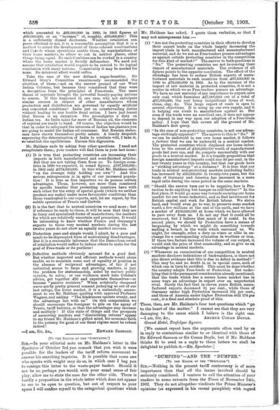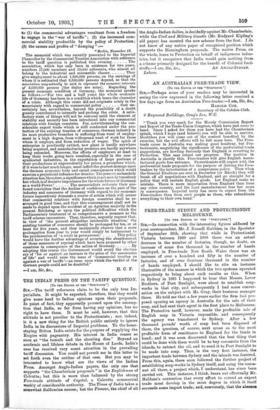"DUMPING} " — AND THE "" DUMPER." pro THE EDITOR OF THE
" SPECTATOR-I Sin,—Nothing in the present tariff controversy is of more importance then that all- the issues -64 seriously considered. I venture to call the attention of yinnl readeis to some extracts from the Timee of NOvember 14th, 1902. They do not altogether vindicate the Prime Minister'S opinions (as expressed in his recent:pamphlet) with regiiid to (1) the commercial advantages resultant from a freedom to engage in the "war of tariffs " ; (2) the increased com- mercial stability producible by the policy of Protection; (3) the causes and profits of " dumping "
"Berlin, November 13. The memorial which was recently presented to the Imperial Chancellor by the Commercial Treaties Association with reference to the tariff question is published this evening The association, which has only been in existence for two years, numbers 17,000 members and 19,000 adherents, who almost all belong to the industrial and mercantile classes They give employment to about 1,500,000 persons, on the earnings of whom it is estimated that 3,500,000 persons depend, so that the association may actually be said to represent the economic interests of 6,000,000 persons [the italics are mine]. Regarding the present economic condition of Germany, the memorial speaks as follows For two and a half years the whole economic life of Germany has been in a condition which bears the character of a crisis. Although this crisis did not originate solely in the
uncertainty with regard to commercial policy that un- certainty has, nevertheless, beyond the possibility of a doubt greatly contributed to intensify and prolong the crisis. A satis- factory state of things will not be restored until the element of stability and security has been introduced into our commercial relations with foreign countries. For, notwithstanding the con- siderable export trade which is still conducted under the pro- tection of the existing treaties of commerce, German industry in its most productive branches is suffering from want of employ- ment in a high degree, from widespread want of work for those whom it employs, and from reduction of wages. The spirit of enterprise is practically extinct, new plant is hardly anywhere being acquired, and manufacturing premises are hardly anywhere being extended. Moreover, the efforts of employers at least to keep their works going have resulted, especially in the case of syndicated industries, in the exportation of large portions of their productions at unprecedently low prices, a procedure which, if it were to last much longer, must inflict the gravest damage upon the German economic body and entail consequences which would exercise a prejudicial influence for decades. The present melancholy situation has, therefore, a significance which is not merely transitory but which is of decisive importance for the whole future of Germany as a world-Power.' The memorialists reiterate their pro- found conviction that the decline of confidence on the part of the industry and commerce of Germany with regard to the economic future imperatively demands a course of action which will secure that commercial relations with foreign countries shall be re- arranged in good time, and that this rearrangement shall not be made to depend upon the accident of an Agrarian majority in the present Reichstag or upon the political difficulties which the Parliamentary treatment of so comprehensive a measure as the tariff scheme encounters. They, therefore, urgently request that, in view of 'the present altogether intolerable situation,' the existing treaties of commerce should be prolonged for ten, or at least for five years, and they incidentally observe that a mere prolongation from year to year would simply be tantamount to the proclamation of • a crisis in permanence.' This policy would have the further advantage of securing the abandonment of. those measures of reprisal which have been prepared by other
countries in consequence of the action of Germany By adopting this course the Government would avoid the election cry of for or against an increase in the price of the necessaries of life' and would raise the issue of ' commercial treaties as against a war of tariffs'—an issue upon which the verdict of the German people could not be doubtful."















































 Previous page
Previous page